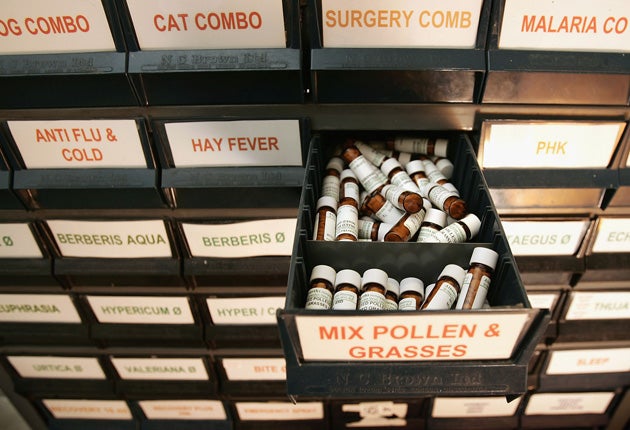Cancer patients who use alternative medicine more than twice as likely to die
After five years, 78.3 per cent of people who opted for medical treatment were still alive compared to just 54.7 percent of people who opted for alternative therapies

Your support helps us to tell the story
From reproductive rights to climate change to Big Tech, The Independent is on the ground when the story is developing. Whether it's investigating the financials of Elon Musk's pro-Trump PAC or producing our latest documentary, 'The A Word', which shines a light on the American women fighting for reproductive rights, we know how important it is to parse out the facts from the messaging.
At such a critical moment in US history, we need reporters on the ground. Your donation allows us to keep sending journalists to speak to both sides of the story.
The Independent is trusted by Americans across the entire political spectrum. And unlike many other quality news outlets, we choose not to lock Americans out of our reporting and analysis with paywalls. We believe quality journalism should be available to everyone, paid for by those who can afford it.
Your support makes all the difference.A new study has shown that cancer sufferers who turn to alternative therapies in preference to conventional medicine are more than twice as likely to die.
Scientists from America's prestigious Yale University found that patients were more likely to be cured through conventional medicine, despite anecdotal evidence from some who say their cancer was cured by turning to natural or alternative remedies, .
Researchers sifted through the National Cancer Database for their study “Use of Alternative Medicine for Cancer and its Impact on Survival”.
They tracked 280 people who were diagnosed with the disease in 2004 and opted for alternative medicine and 560 “control” cancer patients who underwent conventional treatments such as chemotherapy, radiotherapy and surgery.
After five years, 78.3 per cent of people who opted for medical treatment were still alive compared to just 54.7 percent of people who opted for alternative therapies.
The study also looked at different types of cancer including breast, lung,prostate and colorectal.
They found those with lung cancer were twice as likely to die after five years if they had opted for alternative therapies.
Breast cancer patients who used alternative therapies were five times as likely to have lost their lives to the disease.
Colorectal cancer patients were four times more likely to die if they rejected conventional medicine in favour of alternative treatment.
Alternative medicine, advocated by some outside the medical profession to treat cancer includes chiropractic treatment, homeopathy, acupuncture and juice diets.
The researchers could not specifically identify which alternative medicines subjects were using.
Other limitations of the data include unmeasured confounders or selection bias that could impact survival, the researchers noted.
”However, because patients receiving alternative medicine were more likely to be younger, more affluent, more well-educated, and less burdened with comorbidities, this would not likely account for the observed survival differences," they concluded.
The researchers concluded that patients who chose treatment alongside alternative medicine were more likely to die and urged for greater scrutiny of the use of alternative medicine for the initial treatment of cancer.
"We now have evidence to suggest that using alternative medicine in place of proven cancer therapies results in worse survival," said lead author Skyler Johnson.
"It is our hope that this information can be used by patients and physicians when discussing the impact of cancer treatment decisions on survival.”
The findings were published in the Journal of the National Cancer Institute.
Join our commenting forum
Join thought-provoking conversations, follow other Independent readers and see their replies
Comments